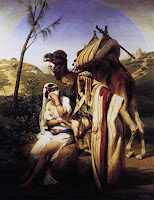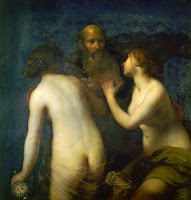Boaz, Ruth, and the Genealogy of Jesus
Q: Why is Boaz listed in the genealogies of David and Jesus rather than Ruth’s deceased husband Mahlon? As kinsman - redeemer, wouldn’t Boaz have honored his kinsman by giving their son Obed the deceased husband’s name?
 A: The book of Ruth involves two related practices. Levirate marriage (cf. Deuteronomy 25:5-10), to which you refer, meant a man would marry his brother’s widow to give the man an heir. We see it invoked to continue an inheritance and protect a widow in Genesis 38, along with the deceitful action of Onan and the broken promises of Judah concerning the widowed Tamar.
A: The book of Ruth involves two related practices. Levirate marriage (cf. Deuteronomy 25:5-10), to which you refer, meant a man would marry his brother’s widow to give the man an heir. We see it invoked to continue an inheritance and protect a widow in Genesis 38, along with the deceitful action of Onan and the broken promises of Judah concerning the widowed Tamar.The Law obligated neither Boaz nor anyone else of Mahlon’s family to marry Ruth. Deuteronomy 25:5 made two specific requirements:“If brothers dwell together ... the wife of the dead man shall not be married outside the family...” and that only “her husband’s brother shall go in to her and take her as his wife and perform the duty of a husband’s brother.” The only man who fully met both these criteria was Mahlon’s brother Chilion — but he also was dead by the end of Ruth 1:5.
However, the extended family had obligations to protect the property and inheritance of its impoverished members. Of this, Leviticus 25:25 says, “If your brother becomes poor and sells part of his property, then his nearest redeemer shall come and redeem what his brother has sold.” This kinsman redemption kept property and inheritances within the family. It protected the land in Judah that had belonged to Elimelech and which passed upon his death to one or both of his sons.
 If a man of Israel died and left behind wife or children, the extended family assumed responsibility for their care. As in the case of Naomi, this usually included taking possession of the land on behalf of the deceased for the benefit of his survivors. According to the laws of inheritance, this land passed on to the heirs of the dead man. Even if no redeemer could be found, a jubilee year still returned the property to its original family.
If a man of Israel died and left behind wife or children, the extended family assumed responsibility for their care. As in the case of Naomi, this usually included taking possession of the land on behalf of the deceased for the benefit of his survivors. According to the laws of inheritance, this land passed on to the heirs of the dead man. Even if no redeemer could be found, a jubilee year still returned the property to its original family.Scripture records no remaining levir for Naomi, Ruth, or Orpah. The Moabitesses Orpah and Ruth presented additional problems, since the Law forbad marriage between Israelites and either Moab or Ammon (see Deuteronomy 23:2-6). While the letter of the Law may have only meant “pure-blood” Moabites living as sojourners in Israel, fears about the treatment of mixed offspring certainly might have led most God-fearing Israelites to reject such a levirate marriage.
In Ruth, however, it seems that we have a “three-sided arrangement” with all three sides willing to go beyond the Law’s strict letter to a greater, kinder fulfillment of its spirit. Naomi convinced Ruth that marriage to a kinsman was not only beneficial but actually possible. Then, while Boaz may have been attracted by her appearance, it was Ruth’s unswerving devotion to her dear mother-in-law and her willingness to work long and hard to support Naomi that did more to catch his eye. Additionally, he was moved by the trust she displayed in naming him above any other potential redeemers (Ruth 3:1-13). Finally (and most importantly), the Lord personally invested Himself in these affairs.
 Mosaic Law specified only that Elimelech’s closest family was obligated keep his property from departing the possession of his widow or legitimate heirs. Yet Boaz went beyond this minimum of commanded behavior. He certainly desired to preserve Elimelech’s inheritance and protect Naomi’s livelihood. However, he also found himself strongly drawn to Ruth.
Mosaic Law specified only that Elimelech’s closest family was obligated keep his property from departing the possession of his widow or legitimate heirs. Yet Boaz went beyond this minimum of commanded behavior. He certainly desired to preserve Elimelech’s inheritance and protect Naomi’s livelihood. However, he also found himself strongly drawn to Ruth.If Boaz only wanted to make sure that Elimelech’s family was properly treated, all he needed to do was make sure that the closest redeemer fulfilled his obligations. Even if Boaz was one of those “if you want something done right then do it yourself” kind of guys, he needn’t have married Ruth in order to redeem Elimelech’s property. It seems that he may have made a really big deal out of marrying Ruth to chase off any potential challengers for Ruth’s hand and that he acted out of love rather than legal obligation to join her in a levirate marriage.
Boaz certainly intended to make Ruth his wife so that “the first son whom she bears shall succeed to the name of his dead brother. (Deuteronomy 25:6)” He said, “Ruth the Moabite, the widow of Mahlon, I have bought to be my wife, to perpetuate the name of the dead in his inheritance.... (Ruth 4:10)” The people’s blessing in response to Boaz’s graciousness invoked the memory of his ancestors: “May your house be like the house of Perez, whom Tamar bore to Judah, because of the offspring that the Lord will give you by this young woman. (4:12)”
 These words, coupled with the genealogies, begin revealing the Lord’s hand. The Book of Ruth alludes to some of mankind’s uglier sins. Tamar disguised herself as a prostitute and bore Perez to her own father-in-law after her husband and first levir both died because of their wicked disregard of the Lord (Genesis 38). Moab (and Ammon) began because Lot’s daughters besotted their father, lay with him, and bore children to him (Genesis 19:30-38).
These words, coupled with the genealogies, begin revealing the Lord’s hand. The Book of Ruth alludes to some of mankind’s uglier sins. Tamar disguised herself as a prostitute and bore Perez to her own father-in-law after her husband and first levir both died because of their wicked disregard of the Lord (Genesis 38). Moab (and Ammon) began because Lot’s daughters besotted their father, lay with him, and bore children to him (Genesis 19:30-38).Matthew’s inclusion of Tamar and Ruth in Jesus’ genealogy emphasizes God’s reconciling work in Christ. The Moabites, Israel’s “cousins” by the relationship between Lot and Abraham, were among the Gentile nations walking in darkness who were brought to the light of the Lord (cf. Isaiah 9:2). At the same time, this greatest “Grandson” of Judah and Tamar brought healing to the often dysfunctional family of Israel.
The other women listed in Jesus’ lineage present similarly checkered pasts. Rahab (Joshua 2; Matthew 1:5) was the prostitute who believed in the Lord and sheltered Israel’s spies in Jericho. The “wife of Uriah” (2 Samuel 11-12; Matthew 1:6) reminded Israel of David’s sins of adultery and murder — but also recalled God’s grace in giving Solomon as David’s son and heir to the throne.
 I believe that God caused Matthew to insert these women’s names and that He inspired the evangelist to remember Boaz, not Mahlon, as “the father of Obed by Ruth.” I think it likely that the Lord wanted to illustrate how He chose His own means in graciously remaking the entire created order through His Son — a redemption and restoration beautifully foreshadowed by Boaz’s actions toward Ruth and Naomi.
I believe that God caused Matthew to insert these women’s names and that He inspired the evangelist to remember Boaz, not Mahlon, as “the father of Obed by Ruth.” I think it likely that the Lord wanted to illustrate how He chose His own means in graciously remaking the entire created order through His Son — a redemption and restoration beautifully foreshadowed by Boaz’s actions toward Ruth and Naomi.Scripture quoted from The Holy Bible, English Standard Version™, © 2001 by Crossway Bibles.
Send email to Ask the Pastor.
Walter Snyder is the pastor of Holy Cross Lutheran Church, Emma, Missouri and coauthor of the book What Do Lutherans Believe.
Technorati Tags: Boaz | Ruth | Naomi | Obed | Mahlon | Orpah | Chilion | Jesus | Christ | Jesus Christ | David | Bathsheba | Rahab | Judah | Tamar | Lot | Lot’s daughters | Jesus Christ | Moab | genealogy | family tree | Matthew | Bible | Bible history | Old Testament | Christology | kinsman - redeemer | levirate marriage | levir

0 Comments:
Post a Comment
<< Home